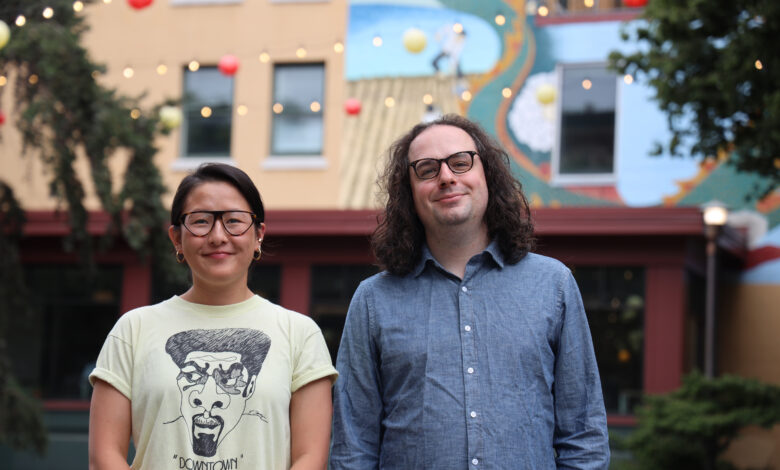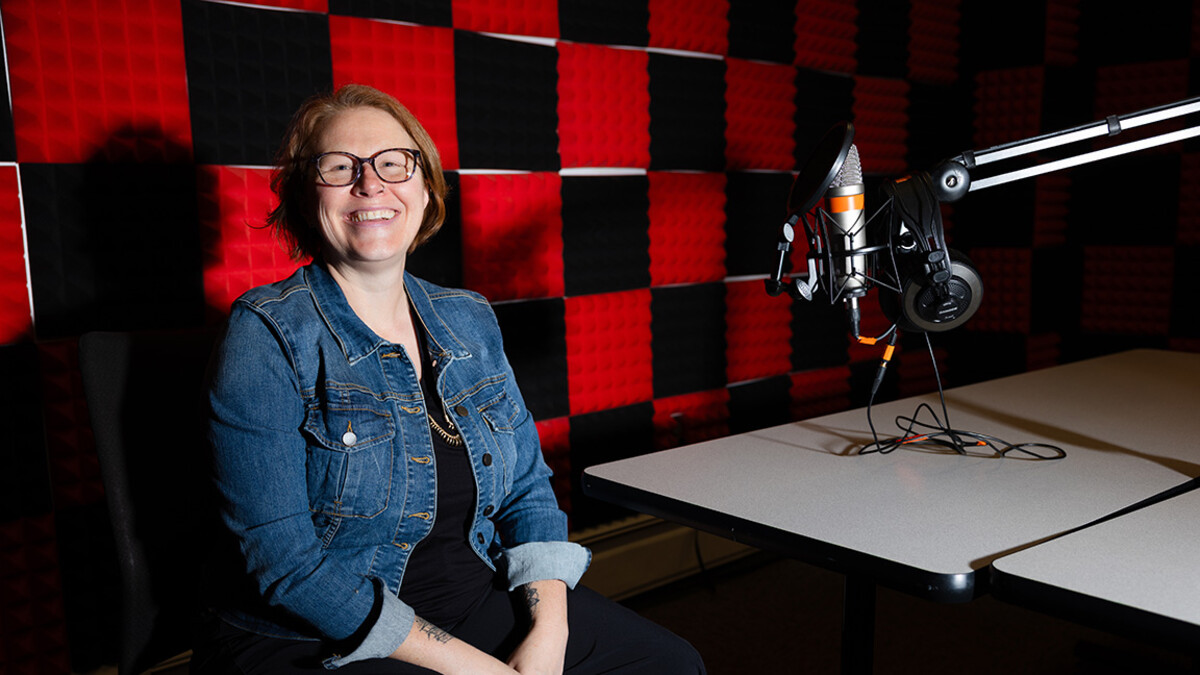International Examiner uplifts everyday people in the CID | Sept. 11–17, 2024

International Examiner (IE) editor in chief Alexa Strabuk 譚文曠 and managing editor Chetanya Robinson are the recipients of Real Change’s 2024 Editorial Excellence award. The award recognizes the outstanding contributions of Strabuk and Robinson — and the IE as a whole — to Seattle’s local news ecosystem.
The IE, which was founded in 1974 and recently celebrated its 50-year anniversary, is the largest and oldest pan-Asian and Pacific newspaper in the country. It publishes on a monthly basis in print and can be found throughout the Chinatown-International District on newsstands inside local businesses. The publication also publishes online at iexaminer.org.
The IE prides itself on its dedicated coverage of the International District and has chronicled how the last 50 years have shaped the neighborhood. Embedded in the community it serves, the newspaper has elevated countless aspiring journalists, writers and artists, giving them a platform to share their stories. Under Strabuk and Robinson, the IE has continued its storied tradition while adapting to the changing news environment of the 2020s. The pair sat down with Real Change to share their insights and perspectives.
This interview has been edited for length and clarity.
Real Change: How did you get started as a journalist?
Alexa Strabuk: I would like to think I’ve always been a journalist, mostly because I am kind of nosy and I like asking questions. So under the guise of professionalism, I now do that for a living, which is really lovely. Professionally, I got started in college, edited my paper there, worked as an ops editor and underwriter, and just kind of fell in love with the storytelling aspect and getting to connect with people that I wouldn’t otherwise. I go way back with the International Examiner. I got started, per se, as a reader first. In high school in particular, the newspaper meant a lot to me. Just having a tangible item to interact with as a young person was really meaningful to me.
I am particularly interested in storytelling, both graphically and written. I love connecting with people, like I said, that I wouldn’t necessarily otherwise have access to and picking their brain about a topic that I probably don’t know that much about.
Chetanya Robinson: I always had an interest in writing and storytelling from a young age and going into college, I was excited about international issues, history, languages, so I had this idea that journalism will be a great way to combine my interests. And luckily, I had a really fantastic intro to journalism class in college, which really got me excited about journalism and hooked on this profession. And so I did a lot of internships and freelancing in college, and it’s just been a really exciting career. I feel fortunate to be able to work in it. I started at the International Examiner first as a freelance reporter in 2015, and over time I started to take on more roles with the publication and now I am a managing editor.
What is the mission of the IE?
Strabuk: The mission of the International Examiner is to promote critical thinking, dialogue and action through topically relevant and culturally sensitive coverage of the Chinatown-International District and Asian, Native Hawaiian and Pacific Islander American communities.
What role does the IE, and especially the work that you do, play in Seattle’s media landscape?
Strabuk: I think a big part of it is accountability. We operate independently. We’re outside of the mainstream media where you might get a particularly dominant narrative that probably serves the interest of businesses or serves the interest of the city. We’re interested in carving out a niche outside of that. How can we really bring the voices of normal people who live and work in the neighborhood to the fore, while also taking into account those other voices, of course, but how can we really spotlight everyday working people?
Robinson: We really try to cover stories that aren’t covered anywhere else or aren’t covered in depth or with nuance. Our hope is really that everyday people who live in the neighborhood and care about the neighborhood can be informed about what’s happening and also that decision makers can be better informed about the neighborhood. We hope, in the ecosystem of local media, that a publication that’s really laser-focused on this neighborhood can help inform other publications. Everyone covers the Chinatown-International District from time to time, but we have a unique sort of charge to cover everything that’s happening day-to-day, and we hope that we can just create a better understanding of the neighborhood through our work.
What does receiving the 2024 Editorial Excellence award mean to you?
Robinson: It means a lot to me to receive this. Real Change is such a visible, iconic publication in Seattle. I always saw the vendors selling Real Change. I remember whenever I would read it, it really struck me with the unique perspectives and the unique coverage and stories.
Do you see any parallels between your own work and Real Change’s mission of providing a voice for our community?
Strabuk: Yeah, there’s tons of overlap between what Real Change does and what we do here at the International Examiner. Spotlighting normal people is one of them. I think being a voice for everyday folks and yeah, just trying to balance out the media landscape.
What are some of your favorite issues or topics to cover?
Robinson: Some of my favorite issues in stories to cover are ones that are about the past, about history and its connection to the present. I end up covering a lot of stories where there are just layers of historical context that are necessary to understand the story and to understand what’s happening. Often there’s three or four different eras of history that I have to try to weave into the story.
There was a story I covered recently about after a fire [that] destroyed the Viet-Wah Supermarket, which was a really beloved supermarket from the 1980s up to a couple years ago when it closed. A fire destroyed the building, but the community in Little Saigon worked together really as fast as they could to save these two guardian lions made of stone that were outside of the building. And these lions in a few years will be part of the new Vietnamese cultural center. And it was a really powerful story to work on.
What’s been one of your favorite stories to write in the last year?
Strabuk: I covered the walkout that recently took place at the Wing Luke Museum, which is a really major institution in our neighborhood. It means a lot to a lot of people, and it represents something special and unique that distinguishes our neighborhood from others. What meant a lot to me working on that story was that the workers who decided to walk out entrusted us with the story in general and spoke on the record with us and didn’t necessarily give that to other mainstream outlets that were covering the strike at the time. So it meant a lot to us that there were 50 years of trust that had been established between folks that are living here in the neighborhood and the newspaper and media outlet that we strive to create.
What challenges do you face as a grassroots news organization?
Strabuk: Like all small operations, we operate on a shoestring budget with limited resources. Luckily, we have made it to 50 years, I think, on the goodwill of this community and the neighborhood that we serve. People have a lot of affection for the IE whenever I bring up that I work here. And so we really are a very small staff operating with limited resources. But there’s also something kind of beautiful about that. I think anytime you’re operating with restrictions, there’s an opportunity to get creative to tap into the relationships that you’ve worked to build and to rely on the strength of what this neighborhood represents.
Robinson: I think everyone who knows about local journalism knows that it’s facing an existential crisis around the country and here in Seattle as well. Northwest Asian Weekly, which is a publication that covers the Chinatown International District as well, they recently ceased their print publication, and so they’re still online, but it’s sort of one less print publication in the neighborhood. And some of the challenges facing local journalism have to do with funding and figuring out a sustainable business model or nonprofit model. A big challenge in general is finding the time and the resources to adequately cover everything that’s going on in the neighborhood. Even though we are a neighborhood-focused publication that is covering a pretty small area, there are so many stories happening, there are so many things going on — we really can’t cover it all. So the challenge of trying to do justice to all the people here, all the amazing work that’s being done, the serious challenge is difficult, but it’s also an honor to try to do every day.
What advice would you give young journalists?
Strabuk: I am not in the business of dispensing advice necessarily; I’m still very much learning myself. But I would say keeping an open mind and leading with curiosity is a good place to start.
Robinson: The advice I’d give to young journalists is to keep learning, to keep an open mind, to get as much experience as possible, to find a mentor, to step out of your comfort zone and cover a story you think you might not be able to. Or if you are primarily a writer, try photojournalism. And really just expand your horizons as much as you can.
Before you go! Real Change exists to provide opportunity and a voice to people experiencing poverty while taking action for economic, racial and social justice.
Our vendors sell our weekly newspaper all over Seattle and the surrounding area, and they rely on the support of our readers to make an income.
Enjoyed the article? Find your local street paper vendor to buy it in print or Venmo a vendor to support their work!
Cat Huber contributed to this reporting.
Read more of the Sept. 11–17, 2024 issue.



